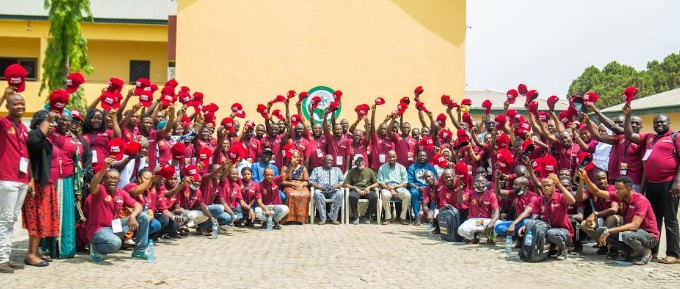A recent capacity-building workshop organised by the Kwara State Government’s Livestock Productivity and Resilience Support Project (L-PRES), in collaboration with the World Bank and the Centre for Dryland Agriculture (CDA) of Bayero University, Kano, has empowered 100 crop and livestock farmers in the state.
The five-day workshop, held in Ilorin, focused on commercial fodder production and value chain addition, to improve livestock productivity and economic independence among practitioners.
One of the beneficiaries, Ajala Khadija Idowu, a female smallholder farmer, praised the initiative, saying it has equipped her with the knowledge to convert farm wastes into quality feeds for improved livestock productivity at reduced costs.
The workshop is part of efforts to boost agriculture in Kwara State and improve the livelihoods of farmers. With the training, farmers are expected to increase their productivity, reduce costs, and enhance their economic independence.
One of the selected beneficiaries of the training workshop, is a female smallholder farmer, Ajala Khadija Idowu, she said that the capacity-building workshop has trained the participants on how to turn farm wastes into quality feeds for improved productivity in livestock at a reduced cost.
“On farmlands, plant residue after harvesting, eg straws and stalks of maize or sorghum are being left, causing waste. However, this capacity-building workshop has trained us on how to turn such items into quality feeds to improve productivity in livestock and thus reduce cost.
“There are different machines to achieve that. Eg fodder choppers, crushers, and cutters meant to turn the waste into small particle feeds for animals. We can also improve the quality of the feed by turning it into silage, which is a fermented feed; high in quality and more digestible for livestock.
“We were also taught how to produce fodder from arable plants and grasses as against making our animals go into people’s farms for grazing, thereby reducing conflict between herders and crop farmers.
She also said that the participants learned how to utilize farm waste to make compost, which is fertilizer.
Also, Prince Olubunmi Isioye, a crop and livestock farmer from the Offa local government area of the state, commended the initiatives behind the programme, describing it as a good innovation for Nigeria.
“Many people complain that the socioeconomic situation in the country is hard. But the program here teaches one how to fish rather than giving one fish. Many people may crave quick money, but this program would make one self-independent, and one would earn money without relying on government. It’s a good idea because it has opened our eyes to many profitable ventures.
“All the farm wastes can be converted to fodder (animals feeds with nutrients) thereby increasing productivity and advantage to make more profit on our livestock. Thus, disallowing animals to graze in people’s farms”, he said.
In his remarks, Dr. Abdulhakeem Ajeigbe of the Centre for Dryland Agriculture, Bayero University Kano (BUK) said that the participants were also taken through challenges of accelerated climate change in terms of rainfall, temperature, humidity, drought, flood, diseases, weed problems, etc.
Dr. Ajeigbe said that if Nigeria is to feed a total of 300 million population expected in the next 25 years, “we need to make agriculture a business. And if it’s to be business, it has to be modernized and market oriented”.
He advised the country to encourage irrigated farming to increase agricultural output to be able to feed the expected 300 million population.
He also said that some of the machines needed for fodder making can be produced locally, to make it interesting for farmers.
Also speaking, the Kwara state L-PRES coordinator, Mr. Olusoji Oyawoye, commended Governor Abdulrahman Abdulrazaq for his continued support and commitment to improving livelihood of smallholder farmers and pastoralists in the state.
The coordinator charged the participants to share the knowledge garnered from the programme with members of their respective communities for greater achievement of the intended goals.
“As you return to your respective communities, I urge you to put into practice the knowledge, skills,
and technologies you have acquired during this program. I also encourage you to share your
newfound expertise with your colleagues, friends, and family members, and to work together to
promote the development of the livestock sector in your communities”, he said.




